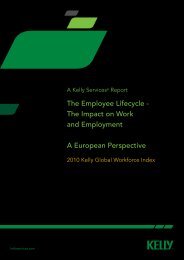Poland as the destination for Shared Services Centers
Poland as the destination for Shared Services Centers
Poland as the destination for Shared Services Centers
Create successful ePaper yourself
Turn your PDF publications into a flip-book with our unique Google optimized e-Paper software.
86 <strong>Poland</strong> <strong>as</strong> <strong>the</strong> <strong>destination</strong> <strong>for</strong> <strong>Shared</strong> <strong>Services</strong> <strong>Centers</strong><br />
7 .6 Labor regulations (<strong>for</strong>ms of employment)<br />
7 .6 .1 General<br />
The principal act regulating Polish labor law is <strong>the</strong> Labor Code. However, under <strong>the</strong> Rome<br />
Convention on <strong>the</strong> law applicable to <strong>the</strong> contractual obligations, it is possible to subject an<br />
employment contract with a Polish citizen to <strong>for</strong>eign law. In this c<strong>as</strong>e however, <strong>the</strong> employee<br />
will be protected by respective, imperative (absolute) provision of law of this country, where<br />
this employer per<strong>for</strong>ms work on a regular b<strong>as</strong>is. All employment contract (governed by Polish<br />
law or subject to Polish law under <strong>the</strong> Rome Convention) conditions should con<strong>for</strong>m to <strong>the</strong><br />
provisions of this Labor Code. Contractual terms unfavorable to employees are automatically<br />
replaced by corresponding provisions of <strong>the</strong> Labor Code.<br />
The Labor Code also applies to <strong>for</strong>eigners employed in <strong>Poland</strong>. Generally, <strong>for</strong>eigners must<br />
obtain a work permit from <strong>the</strong> relevant administration authority and <strong>the</strong> duration of <strong>the</strong><br />
employment contract cannot exceed <strong>the</strong> time, <strong>for</strong> which <strong>the</strong> work permit h<strong>as</strong> been issued.<br />
Work permit proceedings take approximately 1 month to be completed. Never<strong>the</strong>less, from<br />
1 May 2004 <strong>the</strong>re is a group of <strong>for</strong>eigners who are exempt from <strong>the</strong> obligation to acquire<br />
a work permit, in particular citizens of <strong>the</strong> EU Member States, <strong>the</strong> EEA or countries not being<br />
a member to <strong>the</strong> agreement of EEA that may use <strong>the</strong> freedom of movement of workers under<br />
respective agreements with <strong>the</strong> European Community<br />
7 .6 .2 Employment Contracts<br />
The employment contract can have one of <strong>the</strong> following written <strong>for</strong>ms:<br />
• Contract concluded <strong>for</strong> a trial period that may not exceed 3 months<br />
• Contract concluded <strong>for</strong> a limited period of time – this type of contract can be renewed.<br />
However, in <strong>the</strong> event that <strong>the</strong>re are two consecutive contracts <strong>for</strong> a limited period and <strong>the</strong><br />
intervals between <strong>the</strong> contracts are shorter than 1 month, <strong>the</strong> next contract (third one) can only<br />
be concluded <strong>for</strong> an unlimited period.<br />
• Contract concluded <strong>for</strong> a limited period of time to substitute ano<strong>the</strong>r employee, in <strong>the</strong> c<strong>as</strong>e<br />
of his justified absence at work (concluded only <strong>for</strong> <strong>the</strong> specific duration of this absence)<br />
• Contract concluded <strong>for</strong> <strong>the</strong> period required to complete a specified t<strong>as</strong>k<br />
• Contract concluded <strong>for</strong> <strong>the</strong> per<strong>for</strong>mance of c<strong>as</strong>ual or se<strong>as</strong>onal work, work per<strong>for</strong>med on<br />
a repeatable b<strong>as</strong>is (e.g. employment during <strong>the</strong> harvest)<br />
• Contract concluded <strong>for</strong> an unlimited period of time.<br />
All employment contracts can be terminated by mutual agreement of <strong>the</strong> parties. Contracts<br />
<strong>for</strong> a limited period automatically terminate on <strong>the</strong> expiry of that period, and contracts <strong>for</strong><br />
a specified t<strong>as</strong>k automatically terminate on <strong>the</strong> date <strong>the</strong> t<strong>as</strong>k is completed. Most contracts can<br />
be terminated unilaterally, ei<strong>the</strong>r with or without notice, depending on <strong>the</strong> circumstances and<br />
<strong>the</strong> detailed rules, provided by <strong>the</strong> Labor Code.<br />
© 2009 KPMG Sp. z o.o. a Polish limited liability company and a member firm of <strong>the</strong> KPMG network of independent member firms affiliated with KPMG International,<br />
a Swiss cooperative. All rights reserved.










